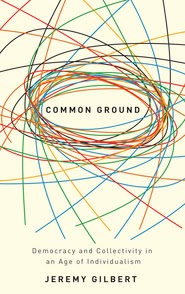Full disclosure: I met Jeremy Gilbert at a Deleuze
conference in Wales in the summer of 2008. He gave an interesting paper on
Deleuze, Guattari, and Gramsci and I ended up talking to him at pub. The
conversation was one of shared interests that went beyond Deleuze, it was a
Deleuze conference after all, to include Simondon, transindividuality, and the
broader problem of reimagining collectivity in individualistic (and
individuated) times. As anyone in academia knows, the experience of meeting
someone with shared interest is often ambivalent. There is the joy of finding
someone to talk to, of feeling less alone in the wilds of academia, coupled
with the sadness of feeling less original, less insightful. The latter feeling
is of course intensified by a publishing culture that is predicated less on
collective projects and more on developing a highly individuated name for
oneself. In the years since then, as our projects progressed (his made it toprint first) we joked about constituting a new school of thought,
Transindividual Ontology and Politics (TOP)?
Sunday, January 12, 2014
Wednesday, January 01, 2014
What Does the University Say? On Macherey's La Parole Universitaire
The fundamental structure of Macherey’s book on the university is familiar to readers of his recent publications on “everyday life” and utopia, as well as anyone who has followed his website “Philosophe au sense large.” As with those works (and courses) a central idea or problem, in this case the idea of the university, is subject to a broad thematic investigation that encompasses philosophy (Kant, Hegel, Heidegger), sociology and psychoanalysis (Bourdieu and Lacan), and literature (Rabelais, Hardy, Nabokov). This is “philosophy in the largest” sense, to borrow the name of Macherey’s course; the different registers and disciplines and knowledge problematize and negate each other as much as they expand upon the central topic.
Subscribe to:
Comments (Atom)

